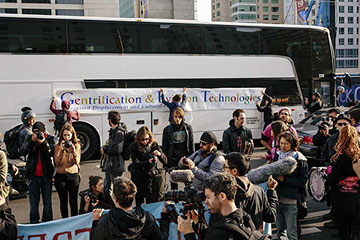
Protesters who blame tech wealth for San Francisco's soaring housing costs blockade a private shuttle filled with Google employees.
(4 of 4)
The gap between rich and poor has grown in the U.S. since the early 1970s. From 2009 to 2012, the top 1% of incomes rose by more than 30%, while the rest grew less than half a percent. The issue is especially painful in San Francisco, a town named for a saint who stripped off his garments and embraced a life of poverty. As America's countercultural hub, it welcomed the bearded beatniks and Summer of Love hippies more than a generation ago. Locals have long been proud of liberal policies that forget no one and tolerate nearly everyone (except people who put recyclables in the wrong bins). But the makeup of the city is changing, and its housing spiral is becoming a national cautionary tale; a Washington mayoral candidate recently raised the specter of becoming "like San Francisco," where the middle class is an endangered species.
One obvious solution to the crisis is to build more housing. Lee has fast-tracked projects for lower-income residents, while city officials are trying to strengthen anti-eviction laws to keep current tenants in place. The mayor also supports raising the minimum wage from $10.74 per hour to possibly $15. And he is encouraging the tech industry, which helped elect him, to contribute more to civic causes.
Solutions to the city's identity crisis are trickier because they depend on whom you ask. Is San Francisco still a place for a poor muralist who renamed himself Ronin, who spends his days scrubbing graffiti off public art and who says the new arrivals "are pretty much exclusively at fault" for his homelessness? Or is it for the striving engineers and entrepreneurs who have jump-started the economy--and who sometimes make offhand comments about people who earn $200,000 as being poor? Many residents want the city to be, as Lee says, a place for "the 100%," but that's a tall order even when there isn't a gold rush.
Lee admits city officials were blinded by the boom. "I don't think we paid any attention to the middle class," he says. "I think everybody assumed the middle class was moving out." Of course, not everyone is willing or able to take refuge elsewhere. Kurt Hillbrand, 26, was born and raised in Bayview, one of the city's poorer neighborhoods. He never left and now drives a cab, chauffeuring passengers from the financial district's skyscrapers to startups in SoMa. "There are lots of jobs for everybody here, but there are lots of jobs that don't make much money," he says. "I like technology. I just can't afford it."
